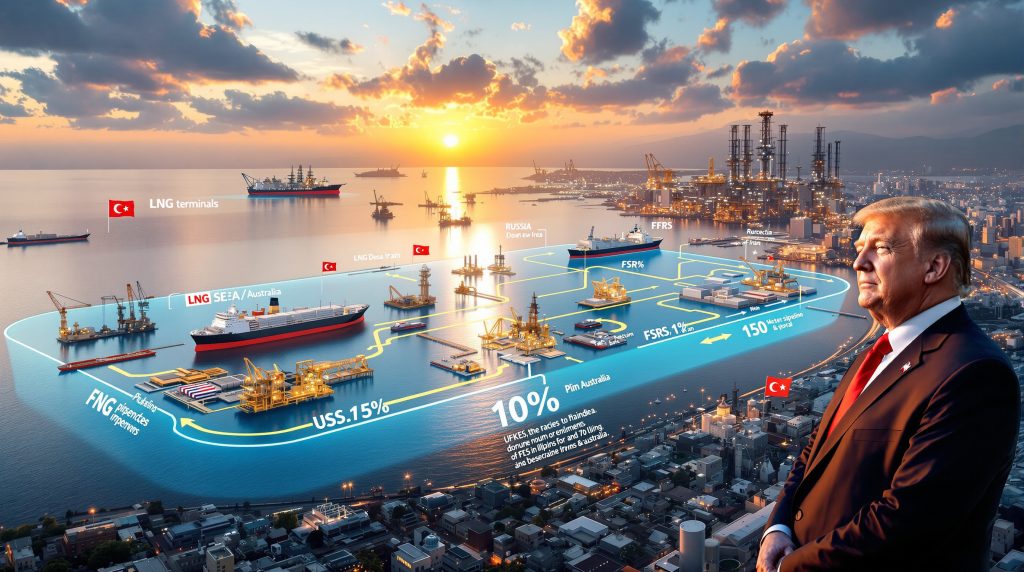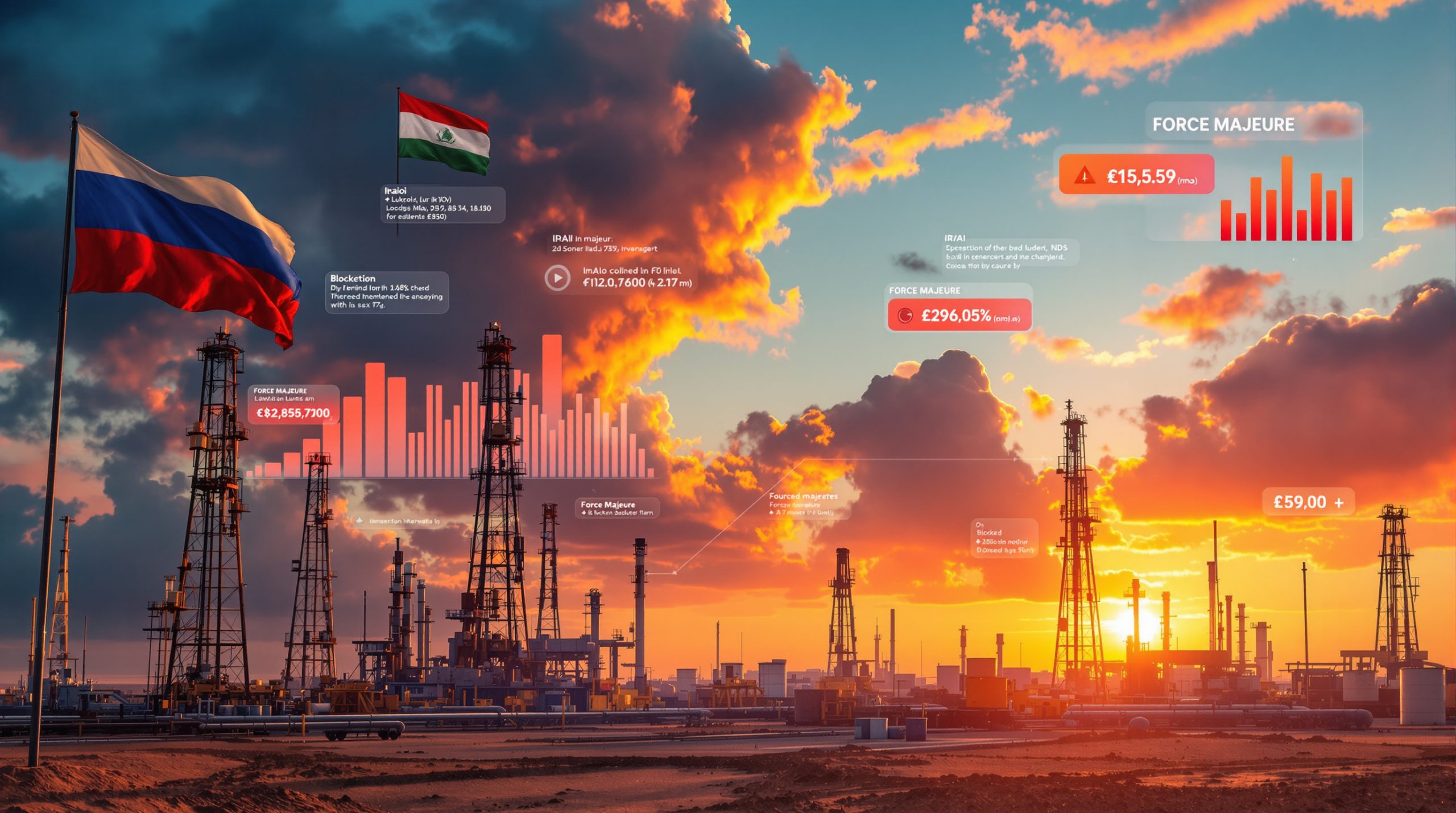Turkey's Strategic Gas Revolution: Breaking the Russia-Iran Dominance
Turkey is executing a comprehensive strategy to dramatically reduce its dependence on Russian and Iranian natural gas, transforming from a captive market to a potential regional energy hub. Through strategic investments in LNG infrastructure, domestic production, and new international partnerships, Ankara is positioning itself to slash pipeline imports by nearly half by 2028 while strengthening its energy security and geopolitical leverage.
Turkey's Current Gas Dependency Challenge
Turkey has historically relied heavily on pipeline gas imports, with Russia and Iran controlling the majority of its supply. As of 2025, the country imports approximately 41 billion cubic meters (bcm) annually through pipelines, with Russia accounting for over 22 bcm and Iran supplying about 10 bcm. This dependency has created significant energy security vulnerabilities and limited Turkey's geopolitical flexibility in the region.
The remaining gas imports come primarily from Azerbaijan, which has served as a more politically neutral supplier but cannot fully meet Turkey's growing energy needs.
The Strategic Pivot to Energy Independence
Turkey's energy transformation involves a multi-faceted approach:
- Expanding LNG import capacity to 58 bcm annually
- Developing domestic Black Sea gas fields
- Establishing long-term contracts with Western suppliers
- Building floating storage and regasification units (FSRUs)
- Creating infrastructure for potential re-export to Europe
This strategy aims to reduce pipeline gas imports from Russia and Iran from 41 bcm to approximately 26 bcm by 2028, representing a 37% reduction in dependency.
The diversification plan is particularly significant as Turkey's total gas consumption has steadily increased over the past decade, driven by industrial growth, urbanization, and the expansion of gas-fired power generation.
What Major LNG Deals Are Reshaping Turkey's Energy Future?
Landmark U.S. LNG Agreement
In September 2025, Turkish state energy company BOTAŞ signed a 20-year agreement with Mercuria to import approximately 4 bcm annually of U.S. liquefied natural gas starting in 2026. This contract will deliver approximately 70 bcm over two decades, representing one of Turkey's most significant steps toward diversification.
The deal marks a major shift in Turkey's energy sourcing strategy, moving away from rigid pipeline contracts toward more flexible LNG arrangements that allow for market-responsive pricing and volume adjustments.
The Australian Connection
BOTAŞ has also established a preliminary agreement with Australia's Woodside Energy that will supply an additional 5.8 bcm over nine years beginning in 2030. This partnership further diversifies Turkey's supply sources beyond traditional regional providers.
Woodside Energy, as one of Australia's largest natural gas producers, brings significant expertise in LNG production and export. The company operates major LNG facilities in Western Australia with an annual production capacity exceeding 15 bcm, ensuring reliable supply capabilities for the Turkish market.
Building Import Infrastructure
Turkey has invested heavily in LNG import terminals, including:
- Floating storage and regasification units (FSRUs) at Dörtyol
- New facilities at Saros
- Modernization of existing import terminals
These investments have expanded Turkey's LNG import capacity to 58 bcm annually—theoretically enough to meet the country's entire demand without pipeline imports.
The FSRU strategy has proven particularly cost-effective, allowing Turkey to rapidly expand import capacity without the lengthy construction timelines associated with traditional onshore terminals. Each FSRU can typically process between 5-7 bcm annually while maintaining the flexibility to be relocated as needed.
How Is Turkey Boosting Domestic Gas Production?
Black Sea Gas Development
Turkey's state oil and gas company TPAO is aggressively developing new gas fields in the Black Sea. Recent discoveries have the potential to significantly boost domestic production, with several fields expected to come online between 2026 and 2028.
The Sakarya gas field, discovered in 2020, represents the cornerstone of Turkey's domestic production ambitions. Initial estimates indicated reserves of approximately 320 bcm, though further exploration has potentially increased this figure.
Production Targets and Timeline
| Year | Projected Domestic Production (bcm) | LNG Import Capacity (bcm) | Combined Domestic + LNG (bcm) |
|---|---|---|---|
| 2025 | ~5 | 58 | ~15 (current utilization) |
| 2028 | ~10 | 58 | ~26 (projected utilization) |
This combined approach aims to boost Turkey's non-pipeline gas supply by more than 26 bcm annually by 2028, up from approximately 15 bcm currently.
The development of Black Sea resources faces significant technical challenges, including deep-water drilling requirements, high pressure environments, and the need for specialized subsea infrastructure. These challenges have necessitated partnerships with experienced international operators to ensure successful oil and gas drilling shift.
What Are the Geopolitical Implications for Russia and Iran?
Russia's Last European Market at Risk
For Russia, Turkey represents one of its last significant gas markets in Europe after most of the continent pivoted away from Russian supplies following the Ukraine invasion. The potential loss of Turkish market share would further isolate Russia's gas sector and reduce its economic leverage in the region.
Russian gas exports to Europe have fallen by more than 60% since 2021, making the Turkish market increasingly important for maintaining Gazprom's export revenues. The timing is particularly challenging as Russia faces significant energy transition challenges to develop new production fields in Eastern Siberia and the Arctic.
Iran's Export Revenue Vulnerability
The implications for Iran could be even more severe. Unlike Russia, which has multiple export markets, Iran's gas exports are largely limited to Turkey. These exports represent a crucial source of revenue for Iran's sanctions-hit economy, as they fall outside the scope of most Western sanctions.
Iran's gas sector has struggled with underinvestment for decades, resulting in significant production constraints. Despite having the world's second-largest gas reserves, the country lacks the infrastructure and technology to diversify its export markets, making the potential loss of Turkish demand particularly damaging.
Pipeline Contract Expirations
Turkey's two main contracts with Russia (totaling 22 bcm/year) are set to expire in the next few years, while Iran's 10 bcm/year supply contract ends in 2026. These expirations provide Turkey with natural negotiation points to reduce volumes or secure more favorable terms.
The contract timing creates a strategic window for Turkey to implement its diversification strategy without triggering immediate diplomatic tensions with either supplier. By waiting for natural expiration points rather than breaking existing agreements, Turkey can minimize political backlash while steadily reducing dependency.
Is Western Pressure Influencing Turkey's Energy Strategy?
U.S. Diplomatic Pressure
Western influence is playing a significant role in Turkey's energy pivot. In recent months, U.S. President Donald Trump explicitly urged Turkish President Erdoğan to cease purchasing oil and gas from Russia. This request came amid broader G7 efforts to "maximize pressure on Russia's oil exports."
The diplomatic exchanges highlight the geopolitical dimensions of energy trade, with the U.S. viewing Turkish energy diversification as an important component of its broader strategy to isolate Russia economically. These developments have sparked concerns about potential tariff economic implications for the region.
Economic Considerations vs. Political Pressure
While Western pressure is a factor, Turkey's strategy is primarily driven by economic and security considerations:
- Reducing vulnerability to supply disruptions
- Gaining price negotiation leverage
- Positioning as a regional gas hub
- Developing domestic resources
- Creating energy infrastructure jobs
Turkey's leadership has consistently emphasized that energy security, rather than geopolitical alignment, drives its diversification strategy. The economic benefits of developing domestic resources and creating a more competitive supply market outweigh the short-term benefits of discounted Russian energy.
Balancing Act with Russia
Turkey's approach has been measured rather than confrontational. President Erdoğan has maintained a delicate balance—gradually diversifying while avoiding direct confrontation with Moscow. Turkey continues to benefit from discounted Russian energy prices, with oil imports at approximately 15% below market rates since 2022.
This balancing act reflects Turkey's broader foreign policy approach, which seeks to maintain working relationships with competing powers while maximizing its own strategic autonomy. The gradual nature of the energy transition allows Turkey to preserve diplomatic ties while steadily reducing economic dependency.
How Is Turkey Expanding Its Energy Influence into Africa?
Somalia Exploration Initiative
Turkey is extending its energy reach into Africa, with the 86-meter research vessel Oruc Reis scheduled to explore offshore oil blocks belonging to Somalia. This expansion builds on Turkey's established military and economic presence in Somalia, where it operates its largest overseas military base and manages key infrastructure.
Turkey has invested over $1 billion in aid to Somalia over the past decade—a significant sum considering Somalia's GDP of just over $10 billion. This long-term investment has established Turkey as a trusted partner in the region, facilitating access to potential energy resources.
Strategic Partnership with Niger
Following political changes in Niger that saw the departure of U.S. and French military forces, Turkey has established new strategic partnerships in the country. A delegation led by Turkish Foreign Minister Hakan Fidan recently signed multiple agreements with Niger's military government, potentially opening new energy opportunities as Niger resumes oil exports.
The Niger partnership is particularly significant as the country recently resumed oil exports through a pipeline operated by China National Petroleum Corp. that links the Agadem oil field to the Sèmè Kpodji terminal in Benin, following the resolution of a border dispute.
Long-term African Strategy
Turkey's African energy strategy appears focused on:
- Establishing presence in politically unstable but resource-rich regions
- Combining security partnerships with energy exploration
- Creating alternatives to traditional European and Middle Eastern partnerships
- Building long-term influence through infrastructure development
This approach mirrors China's successful strategy of combining infrastructure development with resource access across Africa, but with Turkey adding security cooperation as a unique element of its engagement approach.
What Challenges Does Turkey Face in Implementing Its Gas Strategy?
Infrastructure Development Timelines
While Turkey has ambitious plans, the development of domestic gas fields and new import infrastructure faces potential delays and technical challenges. Black Sea gas production, in particular, requires significant investment and technical expertise to fully realize.
Deep-water development projects typically encounter geological and engineering challenges that can delay production timelines. The Sakarya field development has already experienced some delays related to complex subsea conditions and equipment procurement issues.
Price Considerations
Turkey currently benefits from relatively competitive rates for Russian gas. Shifting to LNG imports, particularly from premium suppliers like the United States and Australia, could potentially increase costs in the short term before economies of scale and market competition drive prices down.
The U.S. LNG market in particular operates on a different pricing mechanism than pipeline gas, with prices typically linked to the Henry Hub benchmark rather than oil prices. This creates potential price volatility that Turkey's energy planners must account for in their transition strategy.
Geopolitical Balancing Act
Turkey must carefully manage its relationships with Russia and Iran while pursuing diversification. Both countries have significant leverage in other areas of mutual interest, including regional security, trade, and diplomatic cooperation on issues like Syria.
Russia, in particular, maintains significant influence through its cooperation with Turkey on defense (including the S-400 missile system), nuclear energy (the Akkuyu nuclear power plant), and tourism (Russian tourists constitute a major source of foreign exchange).
Re-export Challenges
Turkey's ambitions to become a regional gas hub face regulatory and infrastructure challenges. Building the necessary interconnections to European markets and establishing favorable transit agreements will require significant diplomatic and financial investments.
The European Union's gas market regulations impose strict requirements on third-party access and unbundling that could complicate Turkey's hub ambitions. Additionally, competing hub projects in Greece and the Eastern Mediterranean could limit Turkey's ability to capture significant transit volumes.
What Does Turkey's Gas Revolution Mean for Regional Energy Security?
Reshaping Regional Power Dynamics
Turkey's energy transformation has the potential to fundamentally alter power dynamics in the Eastern Mediterranean and Black Sea regions. By reducing Russian and Iranian leverage, Turkey gains greater geopolitical flexibility and potentially increases its influence over European energy security.
The shift comes at a time when the Eastern Mediterranean is emerging as a significant gas province, with discoveries offshore Israel, Egypt, and Cyprus creating new regional energy dynamics that Turkey is positioning itself to influence. However, these developments are creating trade war impacts that reverberate throughout global markets.
New Regional Hub Potential
If successful, Turkey could emerge as a crucial energy hub connecting European markets with diverse suppliers, including:
- U.S. and Australian LNG imports
- Domestic Black Sea production
- Potential future Eastern Mediterranean gas
- Central Asian supplies via the Southern Gas Corridor
This hub position would enhance Turkey's geopolitical importance and provide economic benefits through transit fees, trading operations, and increased energy sector employment.
European Energy Security Implications
For Europe, Turkey's transformation could provide an alternative route for gas supplies that bypasses Russia, potentially enhancing the continent's energy security. This would align with broader European efforts to diversify away from Russian energy dependence.
The European Union's REPowerEU plan explicitly calls for diversification of gas supply sources, making Turkey's potential role as a transit country or hub increasingly relevant to European energy security planning.
Can Turkey Successfully Break the Russia-Iran Gas Dominance?
Turkey's ambitious strategy to dismantle Russia and Iran's gas dominance appears increasingly viable, though significant challenges remain. By combining domestic production growth, diversified LNG imports, and strategic international partnerships, Turkey is on track to dramatically reduce its pipeline gas dependency by 2028.
The success of this strategy will depend on Turkey's ability to:
- Complete domestic gas field development on schedule
- Manage the economic transition from discounted pipeline gas to market-priced LNG
- Navigate complex geopolitical relationships with Russia and Iran
- Establish the necessary infrastructure for potential re-export to Europe
- Secure financing for continued energy infrastructure development
If successful, Turkey's energy revolution could transform it from a dependent consumer to a strategic regional hub, fundamentally altering energy geopolitics in the Eastern Mediterranean and beyond.
Balancing Risks and Rewards
The financial implications of Turkey's energy transformation are substantial, with estimated investments in domestic production and import infrastructure exceeding $10 billion over the next decade. This represents both a significant commitment and a calculated risk given the volatility of global energy markets.
For European energy security, Turkey's emergence as a diversification route offers a potential hedge against future Russian supply disruptions. However, European policymakers remain cautious about creating new dependencies, preferring a balanced approach that includes multiple supply corridors and continued investment in renewable energy.
Looking Ahead: The Decade of Transformation
The period from 2025 to 2030 represents the critical window for Turkey's gas strategy implementation. The convergence of contract expirations, infrastructure completion, and field developments during this period will determine whether Turkey can successfully transform its energy landscape and enhance its regional position.
For international energy markets, Turkey's transformation represents an important test case of how middle-power countries can leverage OPEC production impact and energy transitions to enhance their security and strategic autonomy in an increasingly complex geopolitical environment.
According to Reuters' analysis on Turkey's gas diversification, the country's strategic shift could potentially collapse Russia's last major foothold in Europe's energy markets. Additionally, Forum Free Russia reports that Turkey is decisively turning toward U.S. LNG supplies as it cuts Russian and Iranian imports, signaling a major realignment in regional energy partnerships.
Want To Gain An Edge In Mining Investment Opportunities?
Discover how significant mineral discoveries can lead to substantial market returns by exploring Discovery Alert's dedicated discoveries page, where the proprietary Discovery IQ model transforms complex mineral data into actionable insights for ASX investors seeking a market-leading advantage.




